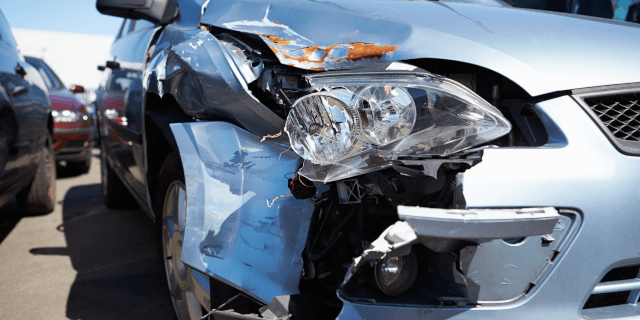Crash for cash scams have hit the headlines recently with the UK’s Insurance Fraud Bureau (IFB) estimating it they costs honest motorists around £340 million every year. So, how can you safeguard against the fraudsters and if you are caught up in a scam, what can you do about it?
What is crash for cash?
It’s when criminals purposely cause a car ‘accident’ with the intention of making a fraudulent claim for large amounts of money. The money earned through a crash for cash scam is often used to fund more crime.
The IFB have identified three main types of scam:
- The staged accident – this typically just involves the criminals, it’s when they purposely crash into each other and make a claim. In some cases, the cars are deliberately damaged by hand to make them look as if they’ve been in an accident.
- The induced accident – this is when innocent motorists are set up so criminals can make claims for compensation.
- The ghost accident – these are essentially fake car accident claims that fraudsters submit to insurers. In some cases, even the cars don’t exist and the entire claim is made up.

How does crash for cash work?
The most frequently highlighted cases are the ‘induced accident’ scams.
Induced accidents typically involve a fraudster’s car suddenly stopping, giving the innocent driver behind no chance to react. The result is, the unwitting motorist hits the scammer’s car from behind – with the criminals then claiming for compensation.
Other incidents include so-called ‘flash for cash’ which is where criminals behind the wheel flash a motorist to give them right of way but crashes into them instead. Some scammers also purposely disable their break lights in order to cause confusion – leading to an accident.
In all these examples, the criminal driver will make exaggerated claims for things like personal injury (for example whiplash), loss of earnings, car hire and vehicle recovery costs.
In a recent twist, some fraudsters are now trying to bribe innocent victims into giving them money there and then in order to ‘hush up’ the accident. Needless to say, this is also a scam and the criminals will take your money as well as put in a claim against you.
How do criminals choose crash for cash victims?
Criminals choose drivers who are likely to have comprehensive car cover but are unlikely to make a fuss. Typically, this includes mums with young children and older drivers.
It’s not just unfortunate drivers at the scene of the crime that criminals are cheating. Fraudulent crash for cash scams are adding an average of £50 to every honest motorist’s insurance premium every year.
How can I tell if car insurance claims against me are a scam?
The IFB have put together some ‘tell-tale’ signs that could indicate you’ve been targeted as part of an insurance scam:
Immediately after the accident, the other driver is very calm.
The majority of people will be shaken up, in shock and in some cases, irritable and angry.
The other driver has their insurance details already prepared and written down.
Injuries appear over the top compared to the force of the accident.
Some incidents involve several passengers in the fraudster’s car. Each one will say they have whiplash (which can be hard to disprove) and go on to make a claim.
The other driver asks you for money in return for keeping quiet about the accident (they may even offer to take you to a cash point). After they’ve taken your money, they very often go on to claim anyway.
Are there any crash for cash hotspots?
Car insurance scams happen all across the country but the IFB have a list of crash for cash hotspots which tend to be clustered in larger towns and cities – they are:
- Birmingham – appears five times within the top ten, the most affected areas are postcodes B6, B8, B10, B11and B25.
- Bradford – particularly postcodes BD3, BD8 and BD9.
- Manchester – most targeted is postcode area M8.
- Oldham – postcode area OL8 is the ninth greatest crash for cash hotspot.
For a full list of the top 30 scam areas, head to IFB, crash for cash hotspots.
How do I report insurance claims frauds?
If you think you’ve been targeted by crash for cash scammers, tell your insurer about your suspicions. You should also tell the IFB, they have a dedicated Cheatline – contact them by phone on 0800 422 0421 or fill out their Cheatline report.
If you’re at the scene of an accident which you suspect to be fraudulent, insist on calling the police – this could put criminals off.
You should also try and take the details of independent witnesses who your insurer can call on for a statement. Be aware that some criminal gangs are sophisticated and will have planted false witnesses.
How to beat crash for cash fraudsters
Defending yourself against an intentional whiplash claim or scam, can be really difficult as it often comes down to your word against someone else’s.
If you’ve got false witnesses and convincing criminals, gathering evidence to prove your innocence can be hard which is why dash cams have proved so popular. Depending on your insurer, having one could even save you money on your premium.
Dash cams can cost as little as £20 so they’re well worth considering (although the more you spend, the better the quality). For suggestions and advice on what to look for, take a look at Car Magazine’s handy guide.
Alternatively, if someone’s made a personal injury claim against you and you don’t have a dash cam, ask for any CCTV footage from the scene of the accident.
If that isn’t available, you’ll need to tell your insurer why you think the claim is fraudulent. If you’re unhappy with the way your insurer is handling your case, you can report them to the Financial Ombudsman Service.
What’s in it for the fraudsters?
Crash for cash is worth a lot of money and estimates suggest that criminals can earn up to £20,000 per accident.
Compensation amounts vary but claims for severe personal injury alone can be in the hundreds of thousands. If you then add in additional payouts for vehicle recovery, expenses and lost earnings, the total value of an insurance scam can be staggering.

What’s the punishment for dealing fraudulently?
Insurers work hard to minimise fraud with some having a strict policy of investigating any claim that appears suspicious. Providers also liaise with the IFB to identify and prosecute criminals.
Punishments for car accident insurance scams vary but courts have shown how serious crash for cash cases are taken by enforcing prison sentences in many cases. In January 2019, a man from Kent narrowly escaped jail after making false claims worth £15,000.
Not so lucky was a Wolverhampton based crash for cash criminal whose claim (had it been successful) would have cost insurance group LV, more than £250,000. Instead, acting on their suspicions, LV investigated and were proved correct with the fraudster sentenced to 12 months in prison.
Crash for cash sentencing was also in the news in Wales last summer as the police and IFB saw more than 150 people convicted of car insurance fraud.
The crash for cash gang were found to have made false claims between 2002 and 2012. Of the 158-strong group, 81 were given jail time.
What is ‘ghost broking’?
Ghost broking is another type of car insurance scam but instead of staging accidents, criminals are falsifying paperwork.
Ghost brokers leave innocent motorists without valid insurance which could result in six penalty points and a £300 fine. For more information and advice on how to prevent becoming a victim this latest insurance scam, read our guide on the rise of ghost brokers.
Stay safe and insured
At mustard.co.uk, we work with some of the leading insurance providers in the UK which means you can be confident about finding a car cover policy that suits your needs and your budget – start your quote today.








